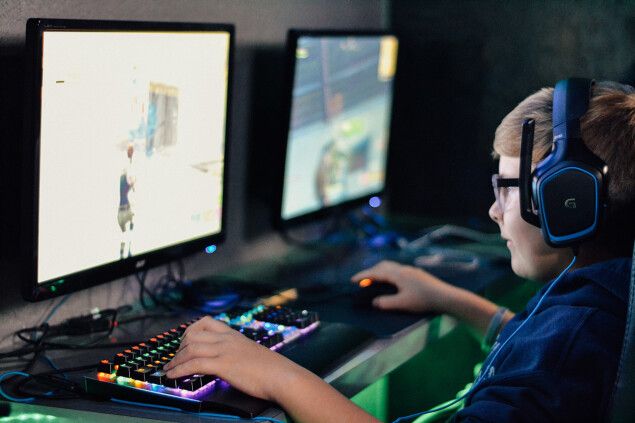Parents and children in the world of gaming: how to find a balance and make games useful
10/2/2025

Video games have long become a part of childhood, and many parents face the question: where is the line between benefit and harm? For children, games are not just entertainment but also a way to learn, communicate, and express themselves. However, if screen time is not controlled, it can affect studies, health, and the development of other skills. Parents, in turn, do not always understand how to properly maintain this balance so that games bring benefits rather than turn into a problem. How can we find the "golden mean" and ensure that video games become a part of development rather than a source of conflicts?
Games as Part of Upbringing


Many parents perceive video games solely as a way to distract children, but in reality, they can be a powerful tool for learning and developing various skills. Through gameplay, a child masters logic, strategic thinking, attention to detail, and learns to make decisions and assess their consequences. Additionally, games can foster perseverance and determination, especially when players face challenging tasks that require patience and persistence.
One of the important skills that can be developed through games is financial literacy. Economic thinking is well-formed in projects with virtual currency, where a child learns to plan expenses, allocate resources, and analyze their value. By understanding in-game economics, they begin to grasp how the financial system works, using robux calculator, what budgeting is, and why not all purchases are equally beneficial. For example, in popular games with a donation system, children encounter issues related to currency exchange, the value of in-game items, and profitable investments.
That is why it is useful not just to leave a child alone with games but to engage in their experience, discuss game mechanics, and explain economic principles. Together, you can analyze examples of successful and unsuccessful purchases, evaluate the profitability of certain decisions, and help the child build a conscious attitude toward money. This approach makes games not just entertainment but also a valuable learning tool.
Limitations Without Bans
Bans rarely bring benefits, especially with video games. Completely restricting gaming time can lead to resistance, secrecy, and family conflicts. The stricter the limits, the greater the temptation to bypass them—children may play in secret or see bans as unfair, damaging trust between parents and kids.
Instead of outright bans, it’s better to find compromises and set flexible rules that balance gaming with responsibilities. A good approach is to agree on gaming time, allowing play only after homework or other tasks. This helps children learn time management rather than blindly following restrictions.
Offering alternatives also helps—balancing gaming with outdoor activities, sports, or board games. The key is to make these changes feel natural rather than like punishments. For example, a weekend gaming marathon can be a reward while weekdays focus on studies.
Parental involvement is also crucial. If parents discuss games with their children—storylines, characters, and mechanics—rules feel more like guidance than control. This approach helps maintain a balance between entertainment and other important activities.
Shared Gaming Experience


Games can be a great way to spend time together, especially when parents actively participate rather than just observe. Many games offer cooperative modes where players team up, overcome challenges, develop strategies, and achieve common goals. This makes gaming more enjoyable and strengthens family bonds.
Playing together helps parents understand their child's interests, thinking style, and emotional reactions. Team-based games improve communication and collaboration skills, while strategy games enhance logical thinking and planning.
Moreover, games create a space for meaningful conversations. While playing, parents and children can discuss not only the game but also personal topics like dreams, fears, and friendships.
Choosing family-friendly games can make the experience even better. Minecraft fosters creativity and teamwork, Overcooked! 2 develops coordination through chaotic cooking challenges, Lego Star Wars: The Skywalker Saga offers fun puzzles, and Rocket League trains reflexes with car-based soccer.
The key is to respect the child’s interests and find games that engage both players. This way, gaming becomes not just entertainment but also a way to strengthen family connections.
Skill Development Through Games
Not all games are equally beneficial, but many of them can help develop important skills that are useful in real life. Games improve reaction speed, attention, logic, creative thinking, and even teamwork abilities. The key is to choose projects that bring not only enjoyment but also value while helping the child understand what skills they are acquiring through gameplay.
For example, strategy games enhance analytical thinking, the ability to predict an opponent's actions, and long-term planning. These types of games teach players to assess situations, analyze potential risks, and make decisions under limited resources. Simulators, on the other hand, can introduce children to real-world professions such as pilot, doctor, farmer, or even engineer. In these games, children gain an understanding of complex processes, learn how to operate machinery, manage resources, and follow instructions.
Puzzle games, quests, and logic-based games train memory, focus, and problem-solving skills. They help develop perseverance, patience, and the ability to concentrate on tasks, which is beneficial not only in gaming but also in academics. Many modern games combine entertainment with education, allowing players to learn new languages, grasp the basics of programming, or explore physics principles in an interactive way.
It is important not just to let children play but to discuss their achievements, analyze difficult moments, and help them apply their gaming skills in real life. If video games are viewed not as mere entertainment but as a development tool, they can become a valuable part of a child's upbringing.
Conclusion
The key to video games is not to ban them but to find a balance. Strict prohibitions rarely bring benefits, whereas a mindful approach can turn games into a valuable tool for learning and communication. When parents get involved in the process, discuss rules, show interest in games, and participate in them alongside their child, gaming stops being a problem. Instead of conflicts, trust is built, and video games become not just entertainment but also a way to strengthen family bonds. It is important not to fear new technologies but to find ways to use them for good, helping children develop skills and creating a warm, supportive family environment.